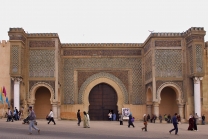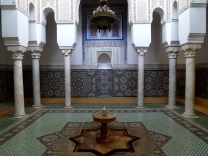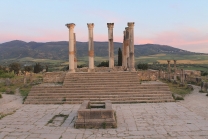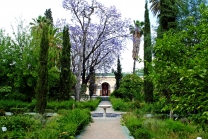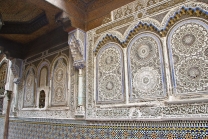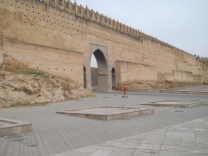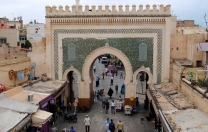No video yet
Meknes
City in Fès-Meknès, MoroccoMeknes (Arabic: مكناس, romanized: Məknas; Berber languages: ⴰⵎⴽⵏⴰⵙ, romanized: Amknas; French: Meknès) is one of the four Imperial cities of Morocco, located in northern central Morocco and the sixth largest city by population in the kingdom. Founded in the 11th century by the Almoravids as a military settlement, Meknes became capital of Morocco under the reign of Sultan Moulay Ismaïl (1672–1727), son of the founder of the Alaouite dynasty. Moulay Ismaïl turned Meknes into an impressive city in Spanish-Moorish style, surrounded by high walls with great doors, where the harmonious blending of the Islamic and European styles of the 17th century Maghreb are still evident today. The city recorded a population of 632,079 in the 2014 Moroccan census. It is the seat of Meknès Prefecture and an important economic pole in the region of Fès-Meknès.
Etymology
Meknes is named after a Berber tribe which, was known as Miknasa (native Berber name: Imeknasen) in the medieval North African documents.
History
A Berber tribe called the Miknasa, originally from the Tunisian south, settled here in the 9th century.
The Almoravids founded a fortress in Meknes during the 11th century. It resisted the Almohads rise, and was thus destroyed by them, only to be rebuilt in a larger size with mosques and large fortifications. Under the Merinids it received further madrasas, kasbahs and mosques in the early 14th century, and continued to thrive under the Wattasid dynasty. Meknes saw its golden age as the imperial capital of Moulay Ismail following his accession to the Sultanate of Morocco (1672–1727). A little known fact if Meknes is that when Moulay Ismail selected it to be the capital city of his empire he actually used European and North American Christian slaves to carry out the work. The Sale coursairs terrorised the Atlantic and Mediterranean and siezed an estimated number close to 1 million sea fairing Christian men and women over a 100 year period. Moulay Ismail actually closed the Moroccan slave markets when he came to power - however this was not for the benefit of the...





